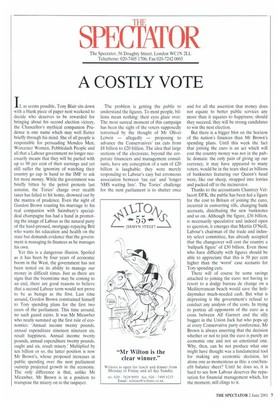A COSTLY VOTE
If, as seems possible, Tony Blair sits down with a blank piece of paper next weekend to decide who deserves to be rewarded for bringing about his second election victory, the Chancellor's mythical companion Prudence is one name which may well flutter briefly through his mind. She of all people is responsible for persuading Monde° Men, Worcester Women, Pebbledash People and all that a Labour government no longer necessarily means that they will be parted with up to 98 per cent of their earnings and yet still suffer the ignominy of watching their country go cap in hand to the IMF to ask for more money. While the government was briefly bitten by the petrol protests last autumn, the Tories' charge over stealth taxes has failed to hit home, drowned out by the mantra of prudence. Even the sight of Gordon Brown toasting his marriage to his real companion with Sainsbury's specialdeal champagne has had a hand in promoting the image of Labour as the natural party of the hard-pressed, mortgage-repaying Brit who wants his education and health on the state but demands evidence that the government is managing its finances as he manages his own.
Yet this is a dangerous illusion. Spoiled as it has been by four years of economic boom in the West, the government has not been tested on its ability to manage our money in difficult times. Just as there are signs that the boomtime may be coming to an end, there are good reasons to believe that a second Labour term would not prove to be as benign as the first. Last time around, Gordon Brown constrained himself to Tory spending plans for the first two years of the parliament. This time around, no such guard exists. It was Mr Micawber who neatly summed up the first rule of economics: 'Annual income twenty pounds, annual expenditure nineteen nineteen six, result happiness. Annual income twenty pounds, annual expenditure twenty pounds, ought and six, result misery.' Multiplied by ten billion or so, the latter position is now Mr Brown's, whose proposed increases in public spending over the next parliament outstrip projected growth in the economy. The only difference is that, unlike Mr Micawber, Mr Brown is in a position to transpose the misery on to the taxpayer.
The problem is getting the public to understand the figures. To most people, billions mean nothing: their eyes glaze over. The most surreal moment of this campaign has been the sight of the voters supposedly terrorised by the thought of Mr Oliver Letwin — allegedly — proposing to advance the Conservatives' tax cuts from £8 billion to £20 billion. The idea that large sections of the electorate, beyond the corporate financiers and management consultants, have any conception of a sum of £20 billion is laughable: they were merely responding to Labour's easy but erroneous association between 'tax cut' and 'longer NHS waiting lists'. The Tories' challenge for the next parliament is to shatter once
and for all the assertion that money does not equate to better public services any more than it equates to happiness; should they succeed, they will be strong candidates to win the next election.
But there is a bigger blot on the horizon of the nation's finances than Mr Brown's spending plans. Until this week the fact that joining the euro is an act which will cost the country money was not in the public domain: the only pain of giving up our currency, it may have appeared to many voters, would be in the tears shed as billions of banknotes featuring our Queen's head were, like our sheep, strapped into lorries and packed off to the incinerator.
Thanks to the accountants Chantrey Vellacott DFK, the public has been fed a figure for the cost to Britain of joining the euro, incurred in converting tills, changing bank accounts, distributing the new banknotes and so on. Although the figure, £36 billion, is necessarily speculative and indeed open to question, it emerges that Martin O'Neill, Labour's chairman of the trade and industry select committee, has already accepted that the changeover will cost the country a 'ballpark figure' of £30 billion, Even those who have difficulty with figures should be able to appreciate that this is 50 per cent higher than the 'worst' case scenario for Tory spending cuts.
There will of course be some savings attached to joining the euro: not having to resort to a dodgy bureau de change on a Mediterranean beach would save the holidaymaker much-needed cash. But what is depressing is the government's refusal to conduct any analysis of the costs. In trying to portray all opponents of the euro as a cross between Alf Garnett and the silly bugger in the Union Jack hat who pops up at every Conservative party conference, Mr Brown is always asserting that the decision whether or not to join the euro is purely an economic one and not an emotional one. Why, then, can he not produce what one might have thought was a fundamental tool for making any economic decision, let alone one as momentous as this: a cost/benefit balance sheet? Until he does so, it is hard to see how Labour deserves the reputation for financial management which, for the moment, still clings to it.










































































 Previous page
Previous page